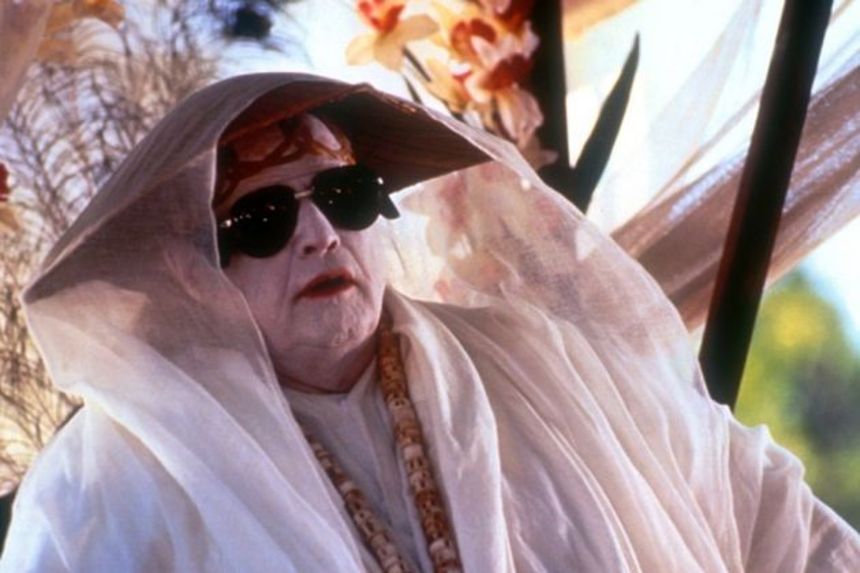Fantastic Fest 2014 Review: LOST SOUL: THE DOOMED JOURNEY OF RICHARD STANLEY'S ISLAND OF DR. MOREAU Proves Far More Successful

One of the more notorious production debacles in recent memory, the maelstrom behind the scenes of New Line's The island of Dr. Moreau (1996) is the subject of this candid and entertaining documentary from David Gregory.
Following the relative success of his first two films, Hardware (1990) and Dust Devil (1992), South African director Richard Stanley was primed to become one of the hottest new talents in Hollywood. Hired by New Line to adapt and direct an adaptation of H.G. Wells' The Island of Dr. Moreau, the film was set to be Stanley's breakout project, but almost from the beginning he found himself at odds with the producers, and was unceremoniously fired from the Australia-based shoot just days into production. However, this would prove to be just the beginning of Moreau's problems, which saw the egos and temperaments of its A-list stars spin wildly out of control, replacement director John Frankenheimer alienate his cast and crew, and a series of costly natural disasters hamper the project at every turn.
Told mostly from Stanley's point of view, director Gregory still manages to retain some degree of balance between the story of a visionary artist chewed up by the Hollywood system, and a studio doing what was necessary to protect their investment from an inexperienced filmmaker out of his depth. He is careful to get all sides of the argument, and while some parties are notably absent - Val Kilmer doesn't feature, while eventual leading man David Thewlis is never even mentioned - Lost Soul does feel like an even-handed appraisal of a calamitous situation.
Wells' novel, first published in 1896, is the story of a pioneering surgeon and scientist who is run out of civilised society for his controversial experiments in vivisection, and becomes a reclusive deity on an island populated solely by his own beastly creations. Written in support of anti-vivisectionist lobbyists at a time when society was still reeling from the arrival of Darwin's The Origin of Species, The Island of Dr. Moreau is today placed alongside works such as R. L. Stevenson's The Strange Case of Dr. Jekyll and Mr. Hyde, Bram Stoker's Dracula and Oscar Wilde's The Picture of Dorian Gray as a pivotal development of both the horror and sci-fi genres as we understand them today.
Moreau was first brought to the big screen in 1932 as Paramount's Island of Lost Souls, directed by Erle C. Kenton and starring Charles Laughton and Bela Lugosi. Since then there have been numerous other filmed versions of Wells' story, but none has managed to faithfully capture the themes and philosophical ideas of the novel to any serious degree. Stanley's new vision, aided by some fantastical conceptual artwork by the great Graham Humphreys, placed the story in a near-future populated by gun-toting beast men, with Moreau resembling a bearded Christ figure. Originally Stanley wanted Das Boot actor Jurgen Prochnov in the lead, but after Marlon Brando became interested in the script he was cast in the role.
Ironically, Wells had a falling out with friend and fellow novelist Joseph Conrad, when the latter's Heart of Darkness was first published, with Wells accusing Conrad of plagiarising his own Moreau. Now Brando had been cast in both roles, following his similarly off-the-wall turn in Apocalypse Now. Stanley's confidence was boosted no end when Brando gave him his full support, spurring him on to make the film increasingly bizarre. However, not even Brando was able to save Stanley in the end from the carnival of chaos that ensued once production moved to the remote jungles of Cairns, Australia.
The connections to Coppola's Vietnam war epic continue, as it was Fax Bahr and George Hickenlooper's Hearts of Darkness (based on the location footage shot by Eleanor Coppola) that really opened the door for documentaries like Lost Soul to become a reality. Last year's Audience Award winner at Fantastic Fest, Jodorowsky's Dune is another fascinating tale of cinematic failure that teases us with glimpses and dreams of what-might-have-been. There is no doubt that Stanley's vision for The Island of Dr. Moreau would have been infinitely more original and exciting than the nonsensical hotchpotch that eventually stumbled onto cinema screens.
The themes Wells tackles in his novel remain just as prescient and controversial today as they did over 100 years ago, and as a result it may still be some time before we see a faithful adaptation of The Island of Dr. Moreau on our screens. However, there is no doubt that it will continue to inspire artists like Richard Stanley to attempt it, although it will be some years before the stink of New Line's 1996 version is scrubbed away. In the meantime, Lost Soul: The Doomed Journey Of Richard Stanley's Island Of Dr. Moreau keeps the conversation and the dreams alive, giving audiences a glimpse of the possibilities the story offers, while also showing us yet again the great conflicts and contradictions at the heart of the commercial film industry.

Do you feel this content is inappropriate or infringes upon your rights? Click here to report it, or see our DMCA policy.






